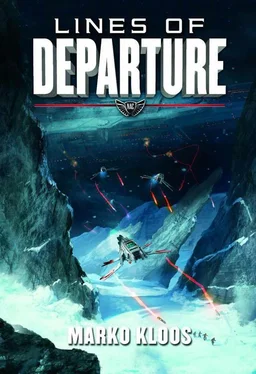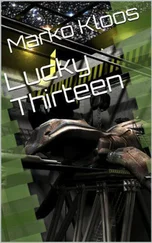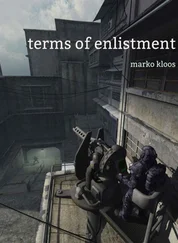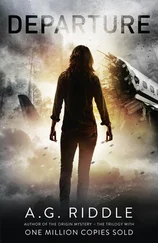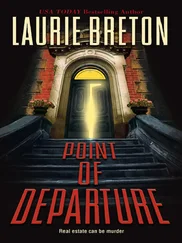Marko Kloos
LINES OF DEPARTURE
For Lyra and Quinn. No matter how many novels I write, you two will always be my biggest accomplishment.
Sometimes, the old sergeants talk about the Good Old Days.
There once was a blessed and mythical time when military service was a desirable job—a ticket to a low-risk career, access to decent food, and tolerable benefits. The military was selective, but when you got in, you were a member of a privileged class for the rest of your life.
Naturally, the Good Old Days came to an end about ten minutes after I signed my enlistment papers.
———
We’ve been fighting a new enemy for almost five years now, and we can’t even agree on a name for them. The xenobiologists came up with an unpronounceable Latin designation that nobody uses outside of a textbook. The infantry grunts, known for prosaicness, call them Lankies or Big Uglies. The Sino-Russians didn’t even have a name for them for the first year of the war, because they believed the North American Commonwealth was spinning tall tales to cover up terraforming disasters or natural calamities on the colonies we lost one by one.
Then the Lankies took SRA-settled Novaya Rossiya, just past the Thirty. One hundred thirty thousand dead colonists later, their scientists finally started to compare notes with ours.
These aliens are eighty feet tall and incredibly thick-skinned, and they roam around in groups. It takes heavy antiarmor munitions to put a dent in a Lanky, and their mile-high terraforming structures won’t budge for anything less than a ten-kiloton tactical nuke. The only way to scrape them off a colony planet is to glass all their atmo exchangers and settlements with a few hundred megatons from orbit, and that sort of treatment makes the place unfit for human resettlement. Once the Lanky seed ships enter the orbit of a colony, that place is no longer ours, one way or the other. To us, it may be a war—to them, it’s just pest control.
When I joined the military, humanity had a few hundred colonies between the SRA and the NAC, from the old settlement on Luna to the newly terraformed New Caledonia just short of the seventy-light-year line. Then the Lankies appeared and kicked us off a colony planet called Willoughby, and five years later we don’t have a single colony left beyond the thirty-light-year line that used to mark the boundary between the inner and outer colonies.
We’re down to sixty-nine colonies, and the number drops by a dozen or more every year. The Lankies show up, exterminate the big settlements, tear down our expensive terraforming stations, raise a fully functioning, superefficient terraforming network in less time than it takes us to send reinforcements through the nearest Alcubierre chute, and make the place their own. Once they’re in orbit, our people on the ground can only scatter and wait for the navy’s evac force to show up, because there’s not a damn thing the garrison marines can do against the Lankies.
When I was a kid, I used to watch the corny military adventure vids on the Networks. I remember the more optimistic ones, where Earth gets invaded by some species even more violent and territorial than our own, and the nations of Earth forget their old differences and stand shoulder to shoulder against the outside threat.
In reality, not even the threat of alien invasion of their colonies could keep the SRA from messing with us and sneaking around behind our backs to take advantage of the fact that three-quarters of our military strength was suddenly diverted to hold the line against the Lankies. On the fringes, we had to dig in to defend our colonies, using garrison battalions and regiments where we had companies and platoons before. On the inner colonies, we suddenly had to deal with increasingly bold SRA raids again, having to pry the Sino-Russians off of colonies that had been secure NAC property for over fifty years.
All in all, the last five years have been anything but low-risk for people in uniform.
Back home, the colony flights have stopped, which has made Earth an even more unpleasant place than it was when I joined up. These flights had two purposes: Relieve the population pressure back home, and give some sort of hope for a better future to everyone who didn’t have a ticket for the colonies yet. A slot on a colony ship was the ultimate lottery win, and as long as there was the chance of scoring one, the restless masses were not completely without prospects. Now even that remote chance is gone, and we have more welfare riots in a month than we used to have in a year. What’s worse, the perpetually cash-strapped government of the NAC is now well and truly broke.
Space colonization is a hideously expensive undertaking, and we lost trillions of dollars in equipment on the colonies the Lankies took away from us. There’s no more ore being mined on those worlds, no more raw materials coming in to offset the expense of colonization, and none of the private corporations are willing to extend loans or take on colony contracts anymore. To top it all off, the military was geared and organized to fight other militaries, and there’s no money left in the budget to refit ten marine divisions and five hundred starships to fight spacefaring eighty-foot creatures instead of Chinese or Russian marines.
Once upon a time, the military may have been a great career. Now we’re an overextended, underfunded, and unappreciated force. Behind us, we have the restless masses of our overpopulated homeworld, and in front of us, we have a new enemy who’s physically and technologically far above us. Only a nutcase would want to get into the service at this point, and you have to have a mental defect to want to stay in after your enlistment contract is up.
Naturally, when the time came for me to sign my name again or pack my things and become a civilian once more, I signed on the dotted line.
“I solemnly swear and affirm to loyally serve the North American Commonwealth, and to bravely defend its laws and the freedom of its citizens.”
I signed my reenlistment form yesterday in the captain’s office, so my butt is already public property for the next five years, but the military likes ritual. We’re in one of the briefing rooms, and the captain and XO are standing on either side of the briefing lectern. Someone dragged out a wrinkled North American Commonwealth flag and draped it over the wall display, and I have my hand in the air as I repeat the oath of service for the second time in my military career. A corporal from the fleet news service is recording the event for whatever reason. Even with our recent troubles, the military still has a 90 percent retention rate after the first term of enlistment, so a re-up ceremony isn’t exactly an uncommon event.
“Congratulations, Staff Sergeant Grayson,” the captain says after I complete the oath. “You’re back in the fold for another five years.”
What else was I going to do, anyway? I think.
“Thank you, sir,” I say, and take the entirely ceremonial reenlistment certificate from his outstretched hand. This means a bonus in my account, which has been growing steadily since my first day of Basic five years ago, but Commonwealth currency is becoming increasingly worthless. By the time I get out, the money in my government account will probably just be enough to pay for a breakfast and a train ride home to the welfare section of Boston.
I didn’t reenlist for the money, of course. I reenlisted because I didn’t know what the hell else to do. All my professional skills revolve around blowing things up or working classified neural-network systems, which makes me pretty much useless in the civilian world. I don’t much feel like going back to Earth and claiming a welfare apartment until I die early. I haven’t been back to Terra since the day I left Navy Indoc at Great Lakes for Fleet School on Luna, but from what I hear over the MilNet, the old homeworld isn’t doing so well. Some guys who have been there on leave recently say that the worst thing we could do to the Lankies would be to let them take the place.
Читать дальше
